In this post I’ll give a brief life update on my initial impressions of academics, housing arrangements, and the prevailing party culture of the University.
Academics
In New Zealand grades are largely determined by a final exam or a series of large exams throughout the semester, rather than by regular homework and quizzes. Another quirk of the New Zealand system is that undergrad lasts only 3 years!
In New Zealand there is a rigorous path to become a “professor”, and teachers who have not achieved this title refuse to be addressed as such. Every teacher that I have, regardless of official title, prefer to be addressed by their first name.
 GEOLOGY 252 Field Studies and New Zealand Geology:
GEOLOGY 252 Field Studies and New Zealand Geology:
My geology professor Steve, is an excellent structural geologist, lecturer, and teacher; and he has a distinct Scottish accent. In the few weeks that I’ve had class with him I’ve learned to use a field compass-clinometer, map complex underground structures, and analyze maps that I’ve drawn to identify useful features such as likely spring locations. He takes the time to get to know everyone in class, and works with individual students. Our class has 30 people, about half are American exchange students. While there is regular homework, it is not for credit. The final course grade is weighted on field reports from our two excursions and a final mapping assessment.
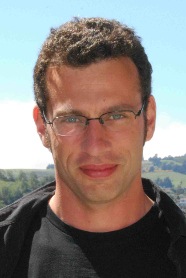 PHYSICS 331 Quantum, Atomic and Particle Physcis:
PHYSICS 331 Quantum, Atomic and Particle Physcis:
My physics professor Ashton is one of the best professors that I’ve ever had. His lectures are well paced and crystal clear, and he makes the effort to personally check in on each student during tutorial sessions. We have one tutorial session a week, where Ashton and Ron, a physics tutor, help us work on the homework and answer any questions we have. There are 16 students in my class, so we’re getting heaps of attention and support. While the true nature of quantum theory is still a confusing mystery, we have subscribed to the popular “shut up and calculate” attitude of modern quantum science. I’m genuinely excited to be in class because of how approachable Ashton has made quantum mechanics.
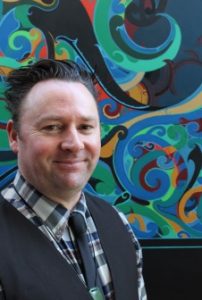 MAOR 110 Introduction to Conversational Māori:
MAOR 110 Introduction to Conversational Māori:
Taipa begins every lecture with a 5 minute address in Māori. One of my biggest goals this semester is to understand what he’s saying in this. Taipa learned Māori as a second language, and was given his name by a Māori elder during his second year studying the language. (Taipa translates as “costal village”) Our class is at least 150 people, but Taipa has gotten to know many student names and calls out individuals to demonstrate pronunciation during lectures. This always puts me on my toes, and keeps the class fully engaged in the lesson. The unique sounds of the Māori language require control of every muscle on my face, tounge, and jaw. For example, the “u” sound must roll out, your lips must be rounded, and you must push your lower jaw out. It’s a much more involved process than any language I’ve studied before, which makes it exceedingly fun to practice with friends.
Flatting and Food
My flatmates and immediate neighbors are some of my best friends at Uni. We’ve established a cooking schedule where we each cook a group meal for one night of the week, and cook for ourselves on the weekends. I’ve mastered the chicken-veggie pasta, Timothy makes a phenomenal sausage and vegetable rice noodle dish, Claire cooks quinoa like no-one’s business, Anni likes anything with potatoes, and Danni makes an unhealthy amount of homemade hummus.
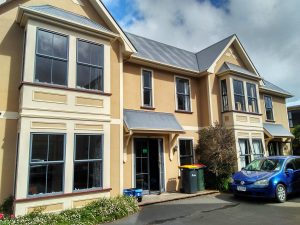
My flat on Castle St.
When we’re not eating at home, there are a number of well-recommended restaurants in the immediate Dunedin area. Last week a group of 30 students from our street packed India Garden, where I ordered a very hot lamb curry and barely managed to hold back tears while finishing off my plate. A popular spot for students is The Bog, our local Irish bar. To purchase drinks you need a special 18+ card or a New Zealand drivers licence, but if you’re like me and haven’t yet bothered to get those you can order a pint of delicious local cider (which comes in pear, berries, or apple). I’ve joined the University Tramping Club, which organizes regular outings, climbing trips, and hikes, but which also grants me discounts at the pub. There are frequently trivia nights, sports viewings, and other community events organized at The Bog. The pub is a social hub where student life mixes with Dunedin locals. It’s a shame Walla Walla doesn’t have the same pub culture.
Parties
Parties are a regular event at the University of Otago, and at least one every day on my street. Castle St. has the reputation as the most party heavy street in town, and living here has its ups and downs. I’ve met some of my best mates (friends) at parties, and everyone I’ve met has been incredibly welcoming to have a total stranger join them. As a general rule, Kiwi’s party in large groups with music and alcohol. Party culture in town is monitored by the campus watch, who exist primarily to protect students, but their presence tends to moderate wild parties. The watch is available to escort students home, even if their home is across town. Their strong presence is reassuring especially when parties seem to be growing out of control. Not all parties are in town though, some are set on the beach or in the surrounding countryside.
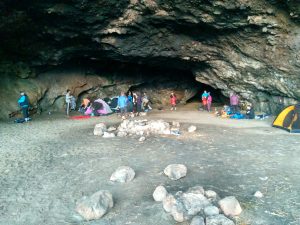
The morning after our cave-bonfire party
My flat recently went to an overnight party at the Long Beach Sea Caves, in the middle of a massive open sandstone cave chamber on the beach. Farther along the cave system were nesting Little Blue Penguins, the worlds smallest penguin. I chose to sleep out on the beach, but penguin echos resonated out from the caves throughout the night. It was decidedly a once-in-a lifetime experience that I could only get at Dunedin.
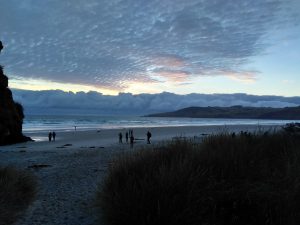
Waking up to a Long Beach sunrise
